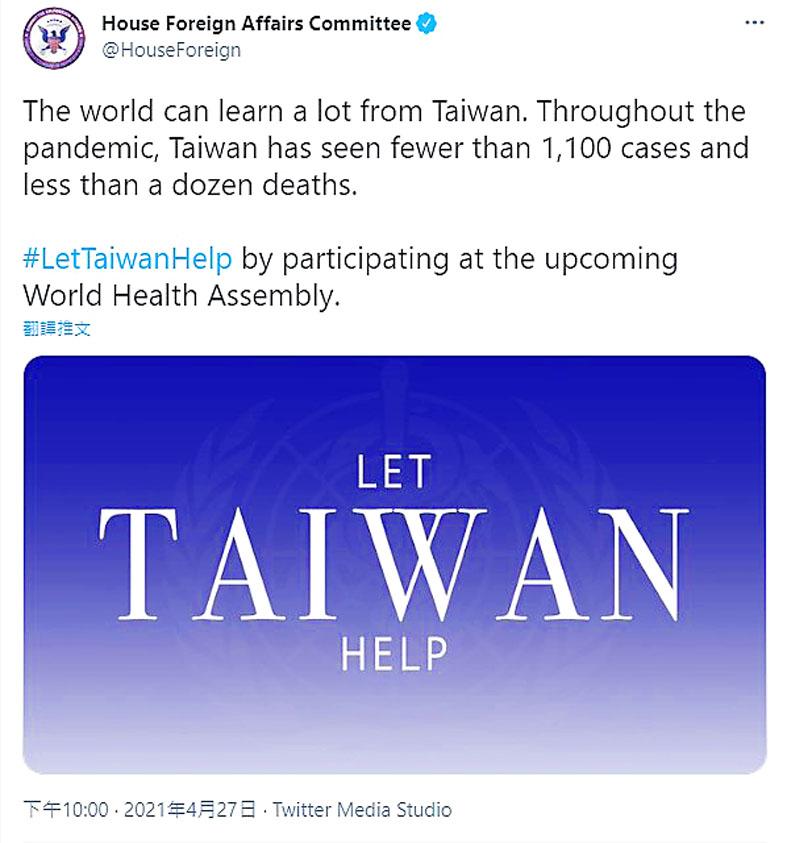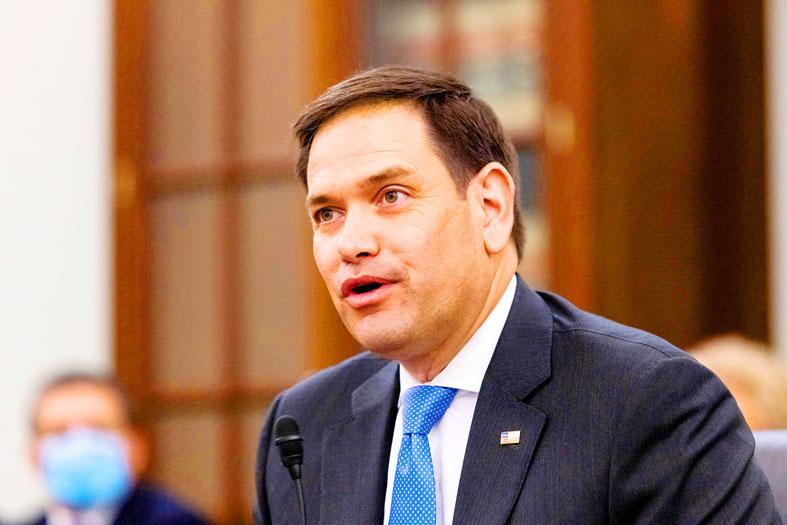Lawmakers and world leaders on Tuesday joined a campaign using the hashtag #LetTaiwanHelp, calling for the nation’s participation in next month’s World Health Assembly (WHA).
The Inter-Parliamentary Alliance on China (IPAC) launched the initiative with a video on Twitter featuring 15 lawmakers from 12 legislatures across Australia, Europe, New Zealand and North America.
The US Senate and House of Representatives committees on foreign affairs joined the alliance in spearheading the 48-hour campaign, which started at 10pm on Tuesday, Taiwan time.

Photo: Screen grab from Twitter
The WHA, the decisionmaking body of the WHO, is to hold its 74th annual meeting virtually from Geneva, Switzerland, from May 24 to June 1.
In the IPAC video, the lawmakers praised Taiwan’s response to the COVID-19 pandemic, its donations of medical equipment and its support for global health initiatives.
Despite this, Beijing has continued to “politicize” global health by blocking Taiwan’s participation in the WHA, creating a “dangerous gap” in global health, while also depriving the world of Taiwan’s medical expertise, they said.

Photo: Reuters
“If Taiwan is left out, we all suffer. It’s time to #LetTaiwanHelp,” the group said, urging others to join the campaign by sharing the hashtag.
In a statement released by IPAC, French Senator Andre Gattolin said that Taiwan’s participation in the WHA “should not even be questioned,” given its vital role in the international community and assistance to other nations during the COVID-19 pandemic.
British lawmaker Iain Duncan Smith said that Beijing’s actions to “politicize global health” were “unacceptable,” and called on “the UK and the free world” to do more to support Taiwan on the international stage.
Lawmakers in the video included US Representative Ami Berra, chair of the House Subcommittee on Asia, the Pacific, Central Asia and Nonproliferation; US Senator Marco Rubio; Duncan Smith; and Australian Senator Kimberly Kitching.
The campaign received support from officials worldwide.
The majority of posts came from US lawmakers, who flooded social media with the hashtag.
US senators Bob Menendez and Jim Inhofe urged their colleagues to pass a bill they reintroduced last month that would instruct the US Department of State to assist Taiwan in obtaining observer status at the WHA.
Czech Senator Pavel Fischer shared a resolution that would call on the Czech government to “challenge the WHO deadlock and allow Taiwan to take part” in the WHA.
Some of the nation’s diplomatic allies also lent their voices, including the leaders of Saint Vincent and the Grenadines, and Saint Kitts and Nevis.
The Ministry of Foreign Affairs yesterday thanked the participants for their “avalanche of support.”
“Our gratitude to friends from democracies worldwide for recognizing #TaiwanCanHelp realize #HealthForAll,” it wrote on Twitter, using the WHO’s slogan.
In a separate statement it praised the “creative” collaboration that saw unprecedented participation from national leaders and representatives.
The campaign “demonstrates that Taiwan’s inclusion in the global health system is the consensus of most democratic nations,” it said, calling on the WHO to extend it an invitation to the WHA.

A magnitude 5.6 earthquake struck off the coast of Yilan County at 12:37pm today, with clear shaking felt across much of northern Taiwan. There were no immediate reports of damage. The epicenter of the quake was 16.9km east-southeast of Yilan County Hall offshore at a depth of 66.8km, Central Weather Administration (CWA) data showed. The maximum intensity registered at a 4 in Yilan County’s Nanao Township (南澳) on Taiwan’s seven-tier scale. Other parts of Yilan, as well as certain areas of Hualien County, Taipei, New Taipei City, Taoyuan, Hsinchu County, Taichung and Miaoli County, recorded intensities of 3. Residents of Yilan County and Taipei received

Taiwan has secured another breakthrough in fruit exports, with jujubes, dragon fruit and lychees approved for shipment to the EU, the Ministry of Agriculture said yesterday. The Animal and Plant Health Inspection Agency on Thursday received formal notification of the approval from the EU, the ministry said, adding that the decision was expected to expand Taiwanese fruit producers’ access to high-end European markets. Taiwan exported 126 tonnes of lychees last year, valued at US$1.48 million, with Japan accounting for 102 tonnes. Other export destinations included New Zealand, Hong Kong, the US and Australia, ministry data showed. Jujube exports totaled 103 tonnes, valued at

TRUST: The KMT said it respected the US’ timing and considerations, and hoped it would continue to honor its commitments to helping Taiwan bolster its defenses and deterrence US President Donald Trump is delaying a multibillion-dollar arms sale to Taiwan to ensure his visit to Beijing is successful, a New York Times report said. The weapons sales package has stalled in the US Department of State, the report said, citing US officials it did not identify. The White House has told agencies not to push forward ahead of Trump’s meeting with Chinese President Xi Jinping (習近平), it said. The two last month held a phone call to discuss trade and geopolitical flashpoints ahead of the summit. Xi raised the Taiwan issue and urged the US to handle arms sales to

BIG SPENDERS: Foreign investors bought the most Taiwan equities since 2005, signaling confidence that an AI boom would continue to benefit chipmakers Taiwan Semiconductor Manufacturing Co’s (TSMC, 台積電) market capitalization swelled to US$2 trillion for the first time following a 4.25 percent rally in its American depositary receipts (ADR) overnight, putting the world’s biggest contract chipmaker sixth on the list of the world’s biggest companies by market capitalization, just behind Amazon.com Inc. The site CompaniesMarketcap.com ranked TSMC ahead of Saudi Aramco and Meta Platforms Inc. The Taiwanese company’s ADRs on Tuesday surged to US$385.75 on the New York Stock Exchange, as strong demand for artificial intelligence (AI) applications led to chip supply constraints and boost revenue growth to record-breaking levels. Each TSMC ADR represents